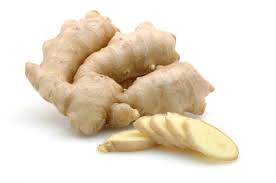Ginger
Zingiber officinalis

 Parts used: root (fresh/dry)
Parts used: root (fresh/dry)
Key actions: Anti-emetic. Anti-inflammatory. Antioxidant. Circulatory stimulant. Stimulates sweatingGinger has been used for in cooking and traditional medicine for thousands of years. It is currently one of the most widely used herbs worldwide.
Ginger has been used traditionally for a long time to treat nausea. Scientific evidence confirms its uses as an herbal remedy for nausea and related ailments such as morning sickness and motion sickness.
Ginger contains many antifungal compounds which make it a popular herb for treating athlete's foot.
The Herb Ginger
(Zingiber officinale )
Studies have shown that ginger inhibits the production of cytokines, which promote inflammation. Therefore, the traditional Indian use for treating inflammation is gaining new found popularity.
Some of the other traditional Asian uses for ginger include stimulating the appetite, promoting perspiration, and fighting body odor.
It has been used to treat pain and traditional Indian Ayurvedic medicinal uses include ginger in herbal arthritis treatment.
Treatment of joint pain, especially those conditions caused by poor circulation, is another popular use of this herb.
Heart health is another benefit of ginger use. It has been shown to slow the production of LDL and triglycerides in the liver and prevent the clotting and aggregation of platelets in the blood vessels, associated with atherosclerosis and blood clots.
Ginger has been used to treat common gastrointestinal complaints such as flatulence, indigestions and diarrhea. It has also been shown to lessen the severity of menstrual cramps.
The ginger root has also been used to treat some of the symptoms of common cold and flu such as loosening phlegm and treating chills.
Cough, asthma, halitosis, high fever, sinusitis, menstrual cramps and colic have been treated traditionally with ginger.
It is a popular herbal remedy for heartburn.
Potential Side Effects of Ginger
Pregnant women should be careful with ginger due to its potential to cause uterine contractions. Ginger has also been shown to interfere with the absorption of dietary iron and fat-soluble vitamins. Stomach upset is a common side effect with larger doses. Ginger may potentiate the effects of blood thinners, barbiturates, beta-blockers, insulin, and other diabetes medications. Due to the blood thinning effect ginger should not be used before surgery.
Therapeutic Dosages
Ginger is available in fresh or dried root, tablets, capsules, powder, tincture, and tea forms.
Customary daily dosages are:
Fresh Ginger Root: 1/3 of an ounce of fresh ginger daily. This can be taken in tea form or used in baking or other herbal uses. Take five to six thin slices of fresh ginger and steep it with hot water for thirty minutes to make a fresh ginger tea.
Dried Ginger Root: 150 to 300 milligrams of the dried ginger root can be taken three times daily in capsule or powder form. It may also be used to make tea. A teaspoonful of the dried powder may be added to a pint of hot water and steeped for 30 minutes to make the tea.
Tablets and capsules generally come in 150 mg to 500 mg doses.













